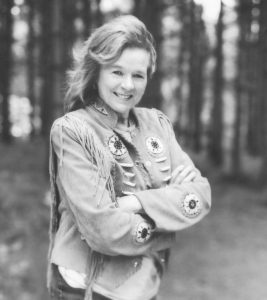Almost a half-century separates them, age-wise, but on record, they both sound ageless. In one corner, the legendary Édith Butler, in the other, rising star Lisa LeBlanc. The girl from Paquetville and the girl from Rosaireville take us on Le Tour du grand bois, in a much more rock-oriented context than what we’re used to from Butler. Yet, “those are sounds I know; that’s what I listened to when I was younger,” says Butler, adamantly. “Big guitars like Johnny Cash – that’s not new to me, but maybe it is for the younger generation who aren’t aware of that style? Whatever the case may be, it’s totally my style!”

Photo: Tony V. Hausser
“It’s been a long time that I’ve been hearing Édith playing with my band, in my mind,” says Lisa LeBlanc about this project, the first she’s taken on as a producer. “I’ve always thought that an album where we re-visit her songs, but with her singing, would be really fun. Édith has written so many good tunes, and I wanted to hear them in that setting,.” And so LeBlanc did, alongside her partners in crime – Maxime Gosselin on drums, Mico Roy on guitars, and her boyfriend Benoît Morier on bass, and various other guitars.
The duo had met in a studio before, when they recorded the McGarrigle sisters’ “Complainte pour Sainte-Catherine” for Butler’s 2013 album Le Retour. But the true spark for this project came while filming the TV show Les Échangistes (hosted by Pénélope McQuade) about three or four years ago. The pair sang one of Butler’s songs, “Ti-Gars,” featured on this project in a pedal-to-the-metal version. “Édith was playing a washboard and she so totally outshone me, it was insane!,” LeBlanc remembers about their appearance on Radio-Canada. “We played the song only once, on that show, but the phone started ringing off the hook,” Butler adds. “Everybody was asking about the album, but there was no album! That’s when we started seriously thinking about it…”
LeBlanc had already planned a sabbatical even before the pandemic hit; this time would be devoted to planning her next album, and exploring another side of her trade: producing. “That’s when I mustered the courage to go to her with that proposition,” says Blanc, who spent a week in Québec’s Eastern Townships where the iconic Acadian Butler now lives. “There’s no denying that Édith is super important for us Acadians,” she adds. “She was one of the first to step out of Acadie playing Acadian music and singing in the Acadian vernacular. She put us on the map, as did Antonine Maillet and Angèle Arsenault. They’re true pioneers, the first to have success in France and Québec. She’s accomplished a lot for us, she paved the way.”
“Lisa came to visit and we spent two weeks together, chatting, eating and taking walks in the woods,” Butler remembers. They also listened to a lot of music. LeBlanc notably played Butler Van Lear Rose, the Jack White-produced 2004 album by the grand dame of country music, Loretta Lynn – which had a major influence on Lisa’s approach for this project: embedding the voice of the great Acadian in a rough-edged jewel box made of folk- and country-tinged rock.
“We poured our hearts, souls, and guts into the album,” says Butler. “The music came naturally; we wanted an album that would ring true. Throughout the recording, Lisa would say to me, ‘I want to bring out the real chick from Paquetville!’ She directed me. I may have a beautiful voice, but if no one gives me directions, that’s all I have: a beautiful voice. Lisa was able to bring out a grain of voice I didn’t know I had in me.”
Together, the two musicians listed the songs that would be featured on this album – original songs as well as adaptations of traditional airs by Butler (“Vishten Avina Vi,” “Le Tour du grand bois,” and “La complainte de Marie Madeleine,” her renowned Marie Caissie adaptation), and a few songs by some of her friends, such as “Ti-Gars” and “Jerrycan” (by Anique Granger).
To top it all off, they also included two covers from the Acadian repertoire. The first one, “Marie Mouri,” is a song penned by David Greely, that Linda Ronstadt also recorded. “Originally, it’s a text that was found on a slave,” says Butler who, very few people know, holds a master’s degree in Ethnography from Université Laval. “I was deeply touched when I heard that story. It’s a beautiful story told from the perspective of a father saying to his young son, ‘You don’t know, you sing and dance, but Marie is dead, and you don’t realize it…’”
The other cover is “Tit Galop pour Mamou,” by Dewey Balfa, a founding member of Frères Balfa, one of the most famous Cajun music groups in Louisiana in the 1960s and ’70s. “I’ve met the Balfa brothers!” says a thrilled Butler. “I participated in this NFB film called Les Acadiens de la dispersion [by Léonard Forest, 1968]. “We went down to Louisiana to meet people, including the Balfa brothers, and we played music together. It’s during the time I spent with them that I heard ‘Tit Galop’ for the first time. That song, to me, is the story of when I met the Balfas.”
For her first stint as a producer, LeBlanc had carte blanche for the album’s musical direction. “What I wanted above all was for Édith to be happy,” she says. “This album is an homage, it’s not my album. It’s also a collaboration, but what mattered the most was to bring out Édith’s voice and personality. That’s the beauty of being a producer: staying in the shadows, not taking up too much space, while still carrying a clear vision for the project.”